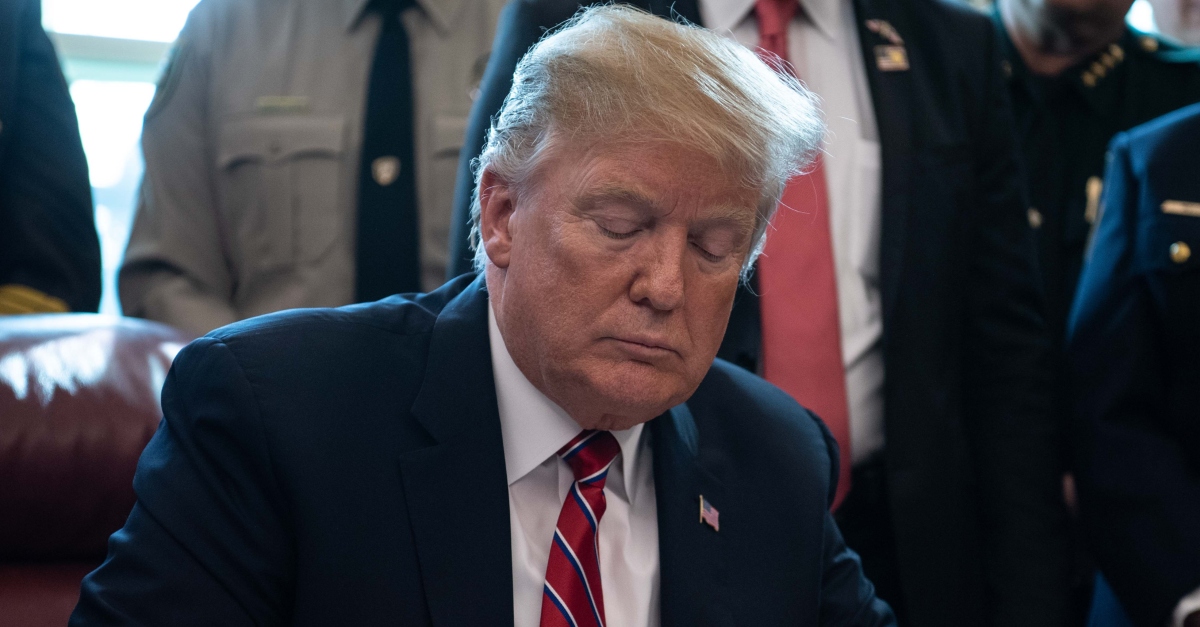
A Cornell University law professor argued at length on Wednesday that the Obama-appointed federal judge who ruled President Donald Trump “cannot block” a congressional subpoena of Mazars USA is much more than right — he’s so right that only a U.S. Supreme Court consumed by “partisan hackery” could find otherwise.
Robert S. Stevens Professor of Law Michael C. Dorf wrote a piece arguing that U.S. District Judge Amit Mehta‘s ruling was a “tour de force.” There was a caveat.
“That does not guarantee that Trump will ultimately lose,” Dorf said. “However, Trump can only prevail in the SCOTUS if the conservative majority engage in hypocritical partisan hackery.”
Recall: Mehta had some pretty strong words Monday regarding this dispute.
Mehta said that “Courts have grappled for more than a century with the question of the scope of Congress’s investigative power,” but added that the “binding principle that emerges from these judicial decisions is that courts must presume Congress is acting in furtherance of its constitutional responsibility to legislate and must defer to congressional judgments about what Congress needs to carry out that purpose.”
While acknowledging that there are “limits on Congress’s investigative authority,” Mehta said that those limits “do not substantially constrain Congress.”
“So long as Congress investigates on a subject matter on which ‘legislation could be had,’ Congress acts as contemplated by Article I of the Constitution,” he continued. “Applying those principles here compels the conclusion that President Trump cannot block the subpoena to Mazars.” Mehta decided that House Democrats have demonstrated “facially valid legislative purposes,” and said that it was not his place to question Congress’ motives.
Not only that, Mehta said it was “simply not fathomable that a Constitution that grants Congress the power to remove a president for reasons including criminal behavior would deny Congress the power to investigate him for unlawful conduct — past or present — even without formally opening an impeachment inquiry.”
He thereby entered an order “in favor of the House Oversight Committee” and denied the request for a stay pending appeal.
Some came away from this anticipating that President Trump will appeal the issue all the way up to the Supreme Court. It seems Prof. Dorf is among this group. For Dorf, only a “partisan” and “hypocritical” Supreme Court would toss Mehta’s judgment aside.
Note, in particular, that Mehta said he was not allowed to consider the Trump argument that Democrats were engaging in a political witch hunt of sorts. As Dorf pointed out, when Mehta countered this argument, he quoted the 1957 Supreme Court case Watkins v. United States.
Although the court held that “there is no congressional power to expose for the sake of exposure,” it also held that it was not for a judge to consider motives:
But a solution to our problem is not to be found in testing the motives of committee members for this purpose. Such is not our function. Their motives alone would not vitiate an investigation which had been instituted by a House of Congress if that assembly’s legislative purpose is being served.
Prof. Dorf said Mehta’s ruling that Congress had provided a facially valid legislative purpose should be “a slam-dunk for Congress.” Then came the elaborated caveat — “unless and until the Supreme Court chooses to repudiate the Watkins test.”
The professor noted that the Supreme Court upheld Trump’s Muslim travel ban because “[t]he courts cannot take notice of the president’s religious bias, even though he repeatedly stated it.” How then, Dorf all-but asked, can the Court “infer an illicit congressional motive to harass the president when a congressional committee subpoenas records that clearly bear on legitimate government business.”
“If law and logic govern, Judge Mehta’s ruling will be upheld,” Dorf concluded. “If Trump’s feeble separation-of-powers objections nonetheless somehow prevail, that will say less about the lines of authority between Congress and the president than it will say about the integrity of the judiciary.”
[Image via Nicholas Kamm/AFP/Getty Images]